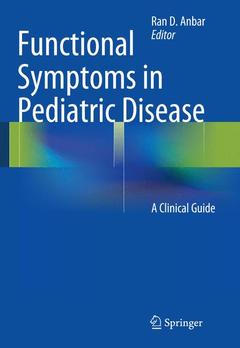Description
Functional Symptoms in Pediatric Disease, 2014
A Clinical Guide
Coordinator: Anbar Ran D.
Language: English
Subjects for Functional Symptoms in Pediatric Disease:
452 p. · 17.8x25.4 cm · Paperback
Description
/li>Contents
/li>Biography
/li>Comment
/li>
Section I: Recognition of Functional Symptoms in Children
Ch. 1: Functional Symptoms In Young People: Conceptualizations, Definitions, Approaches
F. Ralph Berberich
Laurence Irwin Sugarman
Ch. 2: Functional Neurological Disorders: It Is All In The Head
Linda Thomson
Ch. 3: Chest Pain, Syncope and Palpitations in the Pediatric Patient
Frank Coshey Smith
Ch. 4: Functional Symptoms in Pulmonology: Taking your Breath Away
Ran D. Anbar
Ch. 5: Functional Symptoms in Gastroenterology: A Punch to the Gut
Arvind I. Srinath
Susan A. Turner
Eva Szigethy
Ch. 6: Functional Symptoms in Nephrology: Keeping It In and Letting It Out
Thomas R. Welch
Ch. 7: Functional Symptoms In Pediatric Dermatology: The Canary In The Coal Mine
Anna J. Nichols
Ted A. Grossbart
Ch. 8: Psychogenic Influences Associated with Allergic Disorders
Juan L. Sotomayor, Jr.
Ch. 9: Functional and Psychosocial Ramifications of Type 1 Diabetes Mellitus in Pediatric Endocrinology
Nicole L. Pilek
Harold S. Starkman
Ch. 10: Functional Somatic Symptoms in Pediatric Hematology and Oncology
Lamia P. Barakat
Lauren C. Daniel
Richard H. Sills
Ch. 11: Chronic Pediatric Rheumatologic Pain Syndromes
Murray H. Passo
Lara M. Hourani
Ch. 12: Functional Symptoms in Infectious Disease: Reading into Titers
Wendy A. Holz
Jana Shaw
Ch. 13: Functional Symptoms in Medical Genetics
Robert Roger Lebel
Ch. 14: Functional Symptoms in Children Who Have Developmental or Behavioral Differences
Paul G. Taylor
Ch. 15: Functional Symptoms in Pediatric Emergency Medicine
Asalim A. Thabet
Ch.16: Functional Symptoms in Intensive Care: The Vicious Circle of Anxiety and Symptoms
Robert K. Kanter
Regina J. Lozito-Yorton
Ch. 17: Development Of Functional Symptoms In Children Exposed To Traumatic Events
Paula A. Madrid
Robert K. Kanter
Section II: Treatment of Functional Symptoms in Children
Ch. 18: When and how to refer a patient to a mental health care provider
Julie H. Linden
Ch. 19: Cognitive-Behavioral Therapy for Youth with Functional Somatic and Internalizing Symptoms
Daniela B. Colognori
Kathleen Herzig
Laura C. Reigada,
Alycia Leiby
Carrie Masia Warner
Ch. 20: The Use of Biofeedback and Neurofeedback in Pediatric Care
Donald P. Moss
Ch. 21: Hypnosis for Treatment of Functional Symptoms in Children
Ran D. Anbar
Ch. 22: Guided Imagery for Functional Disorders
Moshe S. Torem
Ch. 23: Acupuncture for the Treatment of Functional Disorders in Children
Anjana Kundu
Rosalie F. Tassone
Ch. 24: Mindfulness Meditation for Children
Carisa K. Perry-Parrish
Erica M. S. Sibinga
Ch. 25: Adapting Yoga for Children and Adolescents with Functional Disorders
Lisa C. Kaley-Isley
Ch. 26: Pharmacotherapy of Functional Disorders in Children
Luke A. Probst
Jeni L. Burgess
Ch. 27: Music Therapy in Pediatrics: Clinical Indications for the Treatment of Functional Symptoms
Clare H. Arezina
Ch. 28: Play-Family Therapy: A Biobehavioral Team Approach to Chronic Medical Symptoms
Dottie Higgins-Klein
Chapter authors represent multiple disciplines
Contains case studies, reviews and quizzes
Appendix directs readers to further training opportunities
Includes supplementary material: sn.pub/extras




